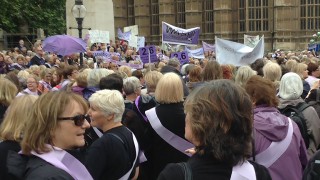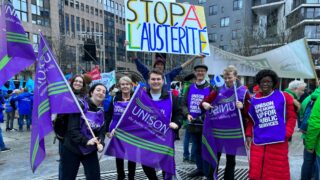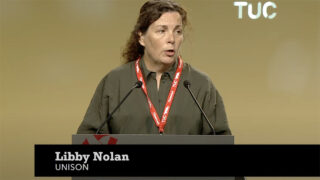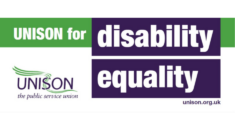
Liz Jackson from Newcastle told national delegate conference delegates that the cuts had “compromised women’s economic independence”, with yet more cuts promised.
Moving a motion yesterday afternoon specifically looking the impact of austerity on women, she told of speaking to women in the poorest ward of Newcastle, and hearing woman after woman who was reporting the negative impact of the cuts.
Susan Phillips from Caerphilly looked back at the history of the struggle for women’s suffrage, but said that UNISON needed to “fight like the brave women in the past” as gains are being lost, adding that “austerity is regressive and damaging against our women”.
For the executive, Anne Moses described the wide range of effects that women feel as a direct result of the cuts: from pay and insecure contracts, to a lack of meaningful flexibility in the workplace, to the reductions in child benefits.
“There are three times more young women doing low-paid jobs than 30 years ago,” she said by way of a single, simple illustration of what is happening.
Manjula Kumari from the national women’s committee reported that the women’s conference earlier this year had heard story after story from women who were themselves suffering as a direct result of the ideology of austerity.
“And it’s getting worse,” she said. “We must campaign to win hearts and minds, and to restore faith in a fair society.”
Cath Elliot from the Eastern region stated that the “Tory cuts are purely ideological” and that the politicians are “doing what they came into politics for – to attack our class”, the state and women, and she called for improved political education.
Sharon Graham from Northumberland County told delegates about her experience as a teaching assistant, where she and many of her colleagues have to do at least a second job just to make ends meet.
She herself holds down three jobs, while her husband is employed full time – just to keep their family’s head above water.
And Sam Hill from Stoke spoke of the increasing impact of the reduction in public transport services, with buses – not just in rural areas, but increasingly in urban areas too.
Since women use buses more than men, it is yet one more cut that is having a disproportionate impact on them – and Iain Duncan Smith now wants to have means tests for concessionary bus passes, which can only impact on women yet again, she explained.
Delegates called on the national executive to:
- continue to highlight the disproportionate impact of austerity on women;
- produce organising material aimed at young women to encourage them to join the union; and
- promote the work of the Public Services Alliance to campaign on and highlight the issues.
Key issue: Women and public spending cuts
UNISON report: Counting the cost: how council cuts shrink women’s lives





